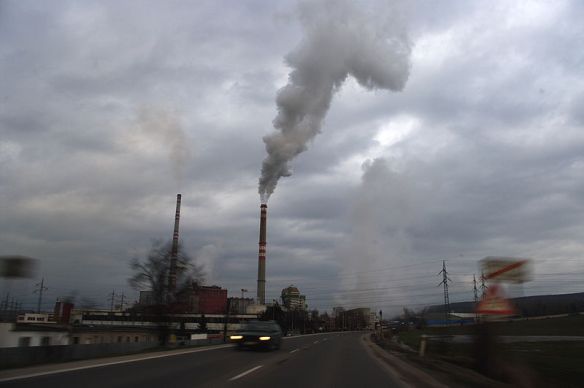
Image via Wikimedia Commons.
On June 2, 2014, the Environmental Protection Agency released a proposal to set carbon pollution standards across the United States. President Obama went on to promote these efforts. He was both applauded and criticized for taking this stance. There is ongoing political controversy as to how much power there should be in the Federal government vs. the State government levels. The EPA is a Federal agency, but the requirements for how states comply with the law is state-by-state. How much collaborative effort did it take for all the individuals, groups and organizations involved to come to this type of agreement? This process probably brought people back to the drawing board many, many times. After all, it takes immediate sacrifice from all those involved to achieve any long-term effects.
Since 1998, there have been rising temperatures globally and we have had the 10 warmest years on record. That means 10 out of the past 16 years have been higher than average. There has also been an increase in extreme weather patterns, such as droughts, floods and wild fires. This has wreaked havoc, incurred significant costs and has increased pubic health threats to those at the greatest level of risk. We also know that carbon pollution is the biggest driver of climate change. That is something we need to more effectively control.
There are many ways of responding to these issues, and ultimately, no response is also a type of response. Morton Deutsch*, a social psychologist, coined Deutsch’s Crude Law of Social Relations, which states, “The characteristic processes and effects elicited by a given type of social relationship also tend to elicit that type of social relationship, and a typical effect tends to induce the other typical effects of that relationship.”
In other words, perceptions of cooperation encourage us to act cooperatively and that, in turn, sets the stage to elicit cooperative behaviors from others. When we have familiar interests and attitudes, it is easier to believe we share common goals. This alignment is more likely to induce cooperative behaviors. The same is true for competition. When we see opposing interests and goals, it leads to the belief: If you achieve your goal I will not achieve mine, thus I must advocate for mine.
We spend so much time resisting and fighting rather than engage in discovering the best way forward. There needs to be a shift in focus from yes or no to how. Reducing pollution through controlling carbon emissions really requires us to be cooperative. If some people are controlling their carbon footprint, but others are not, the impact of this will be slowed down or not felt at all. We are interdependent, we share the same global air even if we think we do not experience that while breathing our local air. In order for acts of cooperation to be present, there needs to be an overarching goal that all parties can support. We need to see the immediate value in getting on board in order to stimulate our motivation. It is also important to identify the needs opposing parties may have; what potentially they think will not be satisfied? Perhaps if jobs are a concern, it’s employment in alternative energy initiatives. Last but not least, we need to pay attention to the feeling of fear we may have when faced with change.
So what does it take for us to see beyond our own immediate needs? How can we make the first move to establish cooperation or turn uncooperative relationships around? Is there too much distance between ourselves and the issue of climate change to really understand the immediate need for cooperative action? When there is no clear personal buy-in (because individuals, groups and organizations have different objectives) we need change leaders, otherwise known as driving forces, that will drive the group to achievement. We need to understand every stakeholder involved and their priorities. In the case of the new EPA guidelines, the effort has been wide. Now, only with true collaborative efforts and time, will we be able to measure success.
We welcome your thoughts and experiences, please comment below!
*Deutsch, M. (2014). Cooperation, competition and conflict. P. 12. In (Eds.) Coleman, P.T., Deutsch, M. and Marcus, E.C. The handbook of conflict resolution: Theory and practice. San Francisco, CA: Jossey-Bass.
